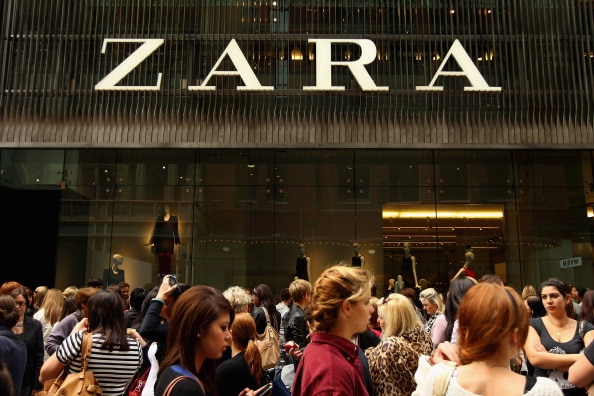Zara owner sees sales soar to £28.8bn as young shoppers shrug off cost of living crisis to splash cash on latest trends

The owner of high street fashion chain Zara said young shoppers remained to spend cash on the latest trends despite rising inflation and the cost of living crisis.
Inditex, which also owns popular brands such as Pull&Bear and Bershka, reported a sales growth of €32.6bn (£28.8bn) up 17.5 per cent from the same period last year.
The Spanish retailer, also said online sales soared 4 per cent over the record figure of 2021 to reach €7.8bn (£6.8bn) this year, as the convenient way of shopping still appears to have a hold on consumers.
Inditex, which has grown to become one of the most popular retail group’s since Philip Green’s Arcadia was forced off the highstreet, also said store sales grew 23 per cent for the year – despite the uncertain economic climate.
Gross profit for the group, which has 16 Zara sites in London, was up €18.5bn (£16.3bn) compared to €15.8bn (£13.9bn) in 2021.
Oscar García Maceiras, chief of Inditex, said: “The excellent results of 2022 show the strength of our business model and its ability to move towards the next level of development in which our fashion proposition, the experience of our customers, our commitment to sustainability and the talent of our teams will continue to be key.”
While the cost of living crisis may weigh heavy on the pockets of shoppers, it appears that large retail groups which target the disposable income Gen Z and Millennials are still making profit.
Just this morning, H&M also revealed its earnings for the first quarter of 2023, with the Swedish retailer posting a sales increase of 12 per cent to SEK 54,872 (£433m).
Zainab Atiyyah, analyst at Third Bridge said “H&M is getting squeezed between the strong competition of quality brands offering reduced prices and the heavy discounters. Compared with H&M, Shein and Primark are selling much cheaper products, while at the same time, Zara is perceived as better in quality.”
“Our experts say H&M is unlikely to see a steep change in its sales growth in Europe and US. The biggest opportunity is now in Asia although the political landscape in China makes this increasingly challenging.”
“H&M still owns a large portfolio of town center stores and this still represents a large part of their sales. Our experts see H&M is likely to close more stores and shift to online sales in the coming 5-10 years, especially in mature markets. Long-term online sales can reach 50% of the total sales.”
“H&M will have to do more discounting in the short term due to its high inventory level, but the long-term strategy is to reduce promotion.”
“The gross margin in 2023 is unlikely to improve due to increasing garments costs and more promotion activities.”